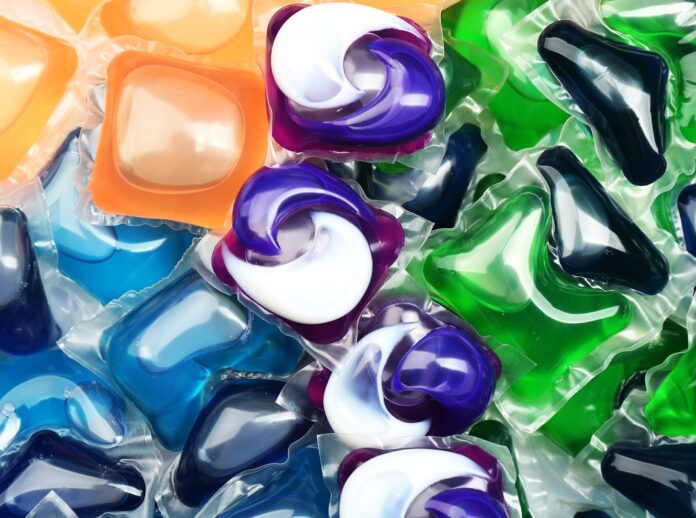When pod-delivered detergent came out, their convenience made them an instant hit with consumers. My wife and I have preferred them ever since over powder and liquid detergent alternatives. But the “biodegradable” material that forms the pods is increasingly under scrutiny. The word nanoplastic has crept into the picture.
I asked my AI assistant, Monica, to give me the poop on pods and their environmental sustainability credentials. This is what it regurgitated:
1. Packaging:
- Detergent pods are typically packaged in plastic, which can contribute to plastic waste if not properly disposed of.
- Some brands are now offering pods in dissolvable or compostable packaging, which can reduce the environmental impact.
2. Water Consumption:
- Detergent pods are highly concentrated, so they require less water per wash compared to traditional detergents.
- This can lead to water savings, especially in areas with water scarcity.
3. Energy Consumption:
- Detergent pods dissolve quickly and work effectively at lower temperatures, reducing the energy consumption of washing machines.
4. Chemical Composition:
- Some detergent pods contain harsh chemicals that can be harmful to aquatic life and the environment.
- Look for pods that are biodegradable and free from harmful substances.
5. Proper Usage:
- Using the correct dosage of detergent pods is crucial to minimize environmental impact.
- Overusing pods can lead to excess chemicals being released into the environment.
6. Recycling and Disposal:
- Dispose of empty detergent pod containers responsibly by recycling them whenever possible.
- Some communities have specific recycling programs for plastic packaging.
I think some of the information Monica provided is a miss rather than on target. Maybe, Monica was thinking about coffee pods when it summarized findings that included recycling and disposal programs. The detergent and dishwashing pods in my question request are all described as water-soluble.
Polyvinyl Alcohol – Is it an Environmental Problem or Benign?
A study published in 2021 described research results out of Arizona State University (ASU) involving the study of pods made from polyvinyl alcohol (PVA), the material found in Tide Pods and Cascade Dishwashing Detergent Pods, the two brands we use. When you read the product information, both are described as water-soluble which sounds like a happy ending, environmentally sustainable, and eco-friendly.
The study, however, paints a different picture. It noted that as much as 61% of PVA ends up as sludge in the environment, with approximately 15.7% broken down to an aqueous state.
The conclusion drawn was that pods made from PVA pose an environmental threat because they don’t completely break down, their chemistry interacts with ecosystems negatively, and they contain hydrophilic contaminants.
In other words, the pods are just another form of plastic pollution. They don’t completely dissolve and biodegrade. Their chemical constituents, made from petroleum, linger in the environment. Without the right water conditions, the right temperatures, the right microbes, and the right amounts of time, PVA chemicals could be hanging around for years.
Data from 2021, the study notes, shows that 650,000 tons of PVA were produced annually with over 4% growth expected yearly. When introduced, the water solubility label gave consumers and the American EPA a picture of an eco-friendly product. But PVA is petroleum-based. It contains ethylene which can negatively affect plants and microorganisms.
Today, washing machines use less water and for PVAs that means trouble because when the volume of liquid is low, the pods turn into viscous solutions or sludge.
It should be stated that not all PVAs are the same. They come in a variety of blends using branding and acronyms that spell PVOH, PVAI, Polyviol, Alcotex, Covol, Gelvatol, Lemol, Mowiol, Mowiflex and Rhodoviol. And PVA isn’t confined in its use to pods. It is also used as a sizing and finishing agent in the clothing industry, as a thickening agent for paints, glues, meat packaging, and pharmaceuticals, and in the paper and food industries.
Plastic Oceans, an organization that is fighting to end plastic pollution, describes the PVA claim of being eco-friendly as environmental greenwashing. On its site, it states “dissolve does not mean disappear.” Its recommendation for using detergents is to buy the ones in the cardboard containers, “or better yet, make your own.”
The manufacturers of laundry and dishwashing pods have a very different take on the subject. They describe pods as safer than traditional detergents. They are less likely to cause skin irritation and allergic reactions. They contain no harsh chemicals or dyes. They are pre-measured so overuse doesn’t lead to environmental pollution.
Procter & Gamble, the manufacturer of Tide Pods describes them as convenient, effective, affordable and safe, particularly for use in high-efficiency machines. It states on its website that “environmental sustainability is important for our world and our future.” It continues noting that it is “maximizing the renewable content profile of all…products and their packaging….short-term goals include creating more technologies to replace petroleum-derived raw materials.”
I’m not sure the company has got the handle on renewable and environmentally friendly packaging right when referring to pods. It appears to be describing bottles and not pods when it states the materials are made from 100% recyclable plastics. So I’ve written to P&G to get answers from them about PVA and its safe, environmentally sustainable use. I’ll let you know what they say.
















